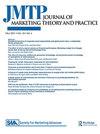The mediating role of Brand Engagement in the Self-Concept (BESC) in explaining consumer response: a meta-analytic review
IF 5.3
Q2 BUSINESS
引用次数: 8
Abstract
ABSTRACT Drawing on self-concept theory, the brand engagement in the self-concept (BESC) construct assesses how consumers incorporate brands in their lives to reinforce their self-schema. Earlier literature on brand engagement suggests that BESC not only influences different consumer response variables, generating mixed outcomes and questionable results, but also plays a mediating role in connecting constructs. The authors extend this line of literature by (1) developing a theoretical framework that includes the influence of materialism and consumer age on consumer response variables through BESC, (2) analyzing the antecedents and consequences of BESC, and (3) testing specific moderators that influence the effect sizes involving BESC. In terms of data collection and analyses, the authors present a meta-analysis of 40 studies that generate 449 effects with 142,808 respondents. To test the theoretical mediating framework, the authors convert all effect sizes in a covariance matrix and use structural equation modeling for estimating the mediating effect of BESC on consumer response. Findings suggest that the indirect effect of materialism and age boost loyalty, behavioral intention, and interactivity through BESC. Second, BESC positively increases the levels of attitude, shopping behavior, quality, and status. Third, our moderating analyses reveal that type of good (product vs. service), type of respondent (students vs. non-students), and data collection mode (online vs. face-to-face) interact with BESC in explaining other variables.自我概念中的品牌参与(BESC)在解释消费者反应中的中介作用:元分析综述
基于自我概念理论,自我概念中的品牌参与(BESC)结构评估了消费者如何将品牌融入生活以强化自我图式。早期关于品牌投入的文献表明,BESC不仅影响不同的消费者反应变量,产生混合结果和可疑的结果,而且在连接结构中起中介作用。作者通过以下方式扩展了这一文献线:(1)建立了一个理论框架,其中包括物质主义和消费者年龄对消费者反应变量的影响,(2)分析了BESC的前因和后果,(3)测试了影响涉及BESC的效应大小的特定调节因子。在数据收集和分析方面,作者对40项研究进行了荟萃分析,产生了449种效应,涉及142,808名受访者。为了检验理论中介框架,作者将所有效应量转换为协方差矩阵,并使用结构方程模型来估计BESC对消费者反应的中介作用。研究结果表明,物质主义和年龄的间接效应通过BESC提高了忠诚度、行为意向和交互性。其次,BESC积极提高了态度、购物行为、品质和地位的水平。第三,我们的调节分析显示,商品类型(产品vs.服务)、受访者类型(学生vs.非学生)和数据收集模式(在线vs.面对面)在解释其他变量时与BESC相互作用。
本文章由计算机程序翻译,如有差异,请以英文原文为准。
求助全文
约1分钟内获得全文
求助全文
来源期刊

Journal of Marketing Theory and Practice
BUSINESS-
CiteScore
6.80
自引率
6.70%
发文量
37
期刊介绍:
The Journal of Marketing Theory & Practice is devoted to the publication of peer-reviewed articles addressing substantive, managerial issues in marketing. In the context of developing, enhancing, and disseminating marketing knowledge, JMTP publishes both conceptual and empirical work, so long as the work provides strong implications for the managerial practice of marketing. Unlike other marketing journals that may be more focused on specific methodological approaches, deal with theoretical issues without regard to application, or represent various subfields of marketing, JMTP is positioned as a general marketing journal affording a quality outlet for more managerially-oriented research across the scope of the field.
 求助内容:
求助内容: 应助结果提醒方式:
应助结果提醒方式:


